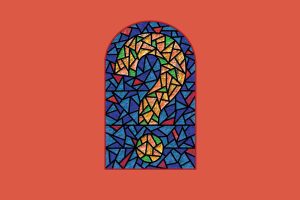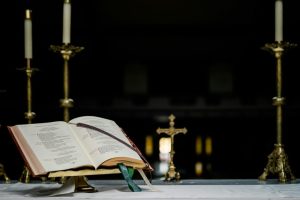There are times when words fail us. When the future seems unbearable, when we see no way forward, when all we can do is scream at God, “Why, God, why?”
It’s tempting, at times like these, to give up. To curl up in bed and shut out the rest of the world. To turn our backs on God—who didn’t protect us from the tragedy. To wrap ourselves in a community of like-minded individuals and rail against the state of the world while simultaneously pretending it doesn’t exist. I think it’s safe to say most of us have felt this way at some point in the last 12 months.
But we are not alone in our grief and fear. Around the world, many of our brothers and sisters are dealing with their world falling apart. Refugees in the Middle East, Africa, and South America know what it is to not have anything and to keep on going even when it seems like you can’t keep on anymore. People here in the United States are dealing with personal violence and uncertainty about their futures that at times seems overwhelming and unending.
To keep on when the world seems to be falling apart without sticking our heads in the sand, we need a way to express our grief and rage—both to God and to each other. Sometimes humans just need a space to let the pain breathe and to acknowledge the suffering around us. We’re not the first people to feel this way: There’s a strong tradition in Judeo-Christian scriptures of despair and railing against God. It’s called lament, and can be found in the psalms, in the writings of the prophets, and in the scriptures written after the (first) destruction of the Temple.
The ancient Israelites were fairly familiar with this feeling of apocalypse. In 587 B.C.E. Babylonian king Nebuchadnezzar laid siege to Jerusalem. The city was plundered and razed to the ground. Government officials were taken captive and deported, women were raped, and the food and water ran out.
For the Israelites, this meant not only that their homes were destroyed, their families ripped apart by violence, and their lives suddenly and terrifyingly made unsafe. But Jerusalem was also the center of their religious life. It was the home of the Temple Solomon had built, which housed the Ark of the Covenant. When the Temple was destroyed, it was the amelioration of every religious symbol and identity the people had. Think what would happen if the Vatican were completely destroyed in a nuclear attack, now imagine that you and all your family and friends call Rome home, and you have a good idea of what the Israelites were feeling in those days.
The book of Lamentations was written in the days after the siege and destruction of Jerusalem. Taking the form of poetry, it was a way for the community to order and articulate their grief—both together and individually. It was also a confession; an acknowledgement that their prophets had foretold this destruction and they had willfully ignored their dire warnings.
“We have transgressed and rebelled, and you have not forgiven. You have wrapped yourself with anger and pursued us, killing without pity; you have wrapped yourself with a cloud so that no prayer can pass through,” the poet cries, “My eyes flow with rivers of tears, because of the destruction of my people.” (Lamentations 3:42–44, 48). God, in Lamentations, is not the caring shepherd or loving Father. God is a lion waiting to rip the Israelites to pieces and the enemy who has demolished his supposed chosen people down to the last corner stone.
And yet, despite the poet’s anger and despair, he continues to cry out to God. He does not turn his back or proclaim that God does not exist. The God to whom he shouts is already there.
Consider this, then: Perhaps the very act of naming our grief is an act of resistance. Through the act of mourning, the community comes together to say, “All is not right. We are suffering and in despair. But we are also still here.” It is through giving voice to the pain that we realize there are others who are experiencing the same thing. And it is the way we join with others to fight through it and to persevere.
For the ancient Israelites, lament was also way to express hope, however dim—this was not the end of history, God’s mercy does not end here, and God’s will is not eternal suffering for the Israelite people. After describing God as a bear or a lion who tears the faithful to pieces, the author of Lamentations goes on to say, “The Lord will not reject forever. Although he causes grief, he will have compassion according to the abundance of his steadfast love; for he does not willingly afflict or grieve anyone” (31–33). A new day will come, God’s people shall overcome.
Faith is not easy. We live in a sinful world, where refugees flee from destroyed cities only to face internment camps and walls barring them from sanctuary. Where unarmed Black men and women are shot and killed by police. Where sexual violence against women is a commonplace occurrence. Why does God let this happen?
The ending of Lamentations is not reassuring to those seeking answers in their faith: “Restore us to yourself, O Lord . . . unless you have utterly rejected us, and are angry with us beyond measure” (21–22). The book ends not with a resolution, but a plaintive question: Is God’s anger permanent?
To many in today’s world, this cry falls close to home. And like in the time of the Israelites, there are no platitudes that will make us feel better. And yet we continue to cry out to God, seeking community with those who are just as heartbroken and lost. May these cries inspire us to work together to change the world for the better. May they give us a sense of belonging. May they give us the courage to work together to protect the needs of those who are suffering even more than we are. May we return to the Lord, and may God forgive us.












